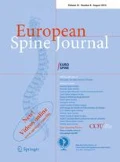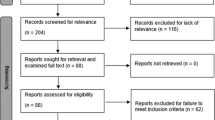Abstract
Purpose
Current evidence regarding the use of exercise therapy in the treatment of adolescent idiopathic scoliosis (AIS) was assessed with a review of published literature.
Methods
An extensive literature search was carried out with commonly used medical databases. A total of 155 papers were identified out of which only 12 papers were deemed to be relevant.
Results
There were nine prospective cohort studies, two retrospective studies and one case series. All studies endorsed the role of exercise therapy in AIS but several shortcomings were identified—lack of clarity of patient recruitment and in the method of assessment of curve magnitude, poor record of compliance, and lack of outcome scores. Many studies reported “significant” changes in the Cobb angle after treatment, which were actually of small magnitude and did not take into account the reported inter or intra-observer error rate. All studies had poor statistical analysis and did not report whether the small improvements noted were maintained in the long term.
Conclusions
This unbiased literature review has revealed poor quality evidence supporting the use of exercise therapy in the treatment of AIS. Well-designed randomised controlled studies are required to assess the role of exercise therapy in AIS.
Similar content being viewed by others
References
Dickson RA, Lawton JO, Archer IA, Butt WP (1984) The pathogenesis of idiopathic scoliosis. Biplanar spinal asymmetry. J Bone Joint Surg Br 66(1):8–15
Murray DW, Bulstrode CJ (1996) The development of adolescent idiopathic scoliosis. Eur Spine J 5(4):251–257
Guo X, Chau WW, Chan YL, Cheng JC (2003) Relative anterior spinal overgrowth in adolescent idiopathic scoliosis. Results of disproportionate endochondral-membranous bone growth. J Bone Joint Surg Br 85(7):1026–1031
Dickson RA (1985) Conservative treatment for idiopathic scoliosis. J Bone Joint Surg Br 67(2):176–181
Weiss HR, Negrini S, Hawes MC, Rigo M, Kotwicki T, Grivas TB, Maruyama T (2006) Physical exercises in the treatment of idiopathic scoliosis at risk of brace treatment—SOSORT consensus paper 2005. Scoliosis 11:1–6
Emans JB, Kaelin A, Bancel P, Hall JE, Miller ME (1986) The Boston bracing system for idiopathic scoliosis. Follow-up results in 295 patients. Spine 11(8):792–801
Scoliosis Research Society Website (2011) Available at: http://www.srs.org/professionals/education/adolescent/idiopathic/treatment.php. Accessed on April 2011
Lenssinck ML, Frijlink AC, Berger MY, Bierman-Zeinstra SM, Verkerk K, Verhagen AP (2005) Effect of bracing and other conservative interventions in the treatment of idiopathic scoliosis in adolescents: a systematic review of clinical trials. Phys Ther 85(12):1329–1339
Negrini S, Antonini G, Carabalona R, Minozzi S (2003) Physical exercises as a treatment for adolescent idiopathic scoliosis. A systematic review. Pediatr Rehabil 6(3–4):227–235
Negrini S, Fusco C, Minozzi S, Atanasio S, Zaina F, Romano M (2008) Exercises reduce the progression rate of adolescent idiopathic scoliosis: results of a comprehensive systematic review of the literature. Disabil Rehabil 30(10):772–785
Wan L, Wang G-x, Bian R (2005) Exercise therapy in treatment of essential S-shaped scoliosis: evaluation of Cobb angle in breast and lumbar segment through a follow-up of half a year. Zhongguo Linchuang Kangfu 9:82–84
Negrini S, Negrini A, Romano M, Verzini N, Negrini A, Parzini S (2006) A controlled prospective study on the efficacy of SEAS.02 exercises in preparation to bracing for idiopathic scoliosis. Stud Health Technol Inform 123:519–522
Negrini S, Negrini A, Romano M, Verzini N, Negrini A, Parzini S (2006) A controlled prospective study on the efficacy of SEAS.02 exercises in preventing progression and bracing in mild idiopathic scoliosis. Stud Health Technol Inform 123:523–526
Weiss HR, Goodall D (2008) The treatment of adolescent idiopathic scoliosis (AIS) according to present evidence. A systematic review. Eur J Phys Rehabil Med 44(2):177–193
Weiss HR, Hollaender M, Klein R (2006) ADL based scoliosis rehabilitation–the key to an improvement of time-efficiency? Stud Health Technol Inform 123:594–598
Weiss HR (1995) The Schroth scoliosis-specific back school—initial results of a prospective follow-up study. Z Orthop Ihre Grenzgeb 133(2):114–117 (discussion 118–119)
Weiss HR, Klein R (2006) Improving excellence in scoliosis rehabilitation: a controlled study of matched pairs. Pediatr Rehabil 9(3):190–200
Weiss HR, Weiss G, Petermann F (2003) Incidence of curvature progression in idiopathic scoliosis patients treated with scoliosis in-patient rehabilitation (SIR): an age- and sex-matched controlled study. Pediatr Rehabil 6(1):23–30
CEBM, Centre for Evidence Based Medicine (2010) Available at: http://www.cebm.net/index.aspx?o=100. Accessed on December 2010
Negrini S, Zaina F, Romano M, Negrini A, Parzini S (2008) Specific exercises reduce brace prescription in adolescent idiopathic scoliosis: a prospective controlled cohort study with worst-case analysis. J Rehabil Med 40(6):451–455
Shea KG, Stevens PM, Nelson M, Smith JT, Masters KS, Yandow S (1998) A comparison of manual versus computer-assisted radiographic measurement. Intraobserver measurement variability for Cobb angles. Spine 23(5):551–555
Adam CJ, Izatt MT, Harvey JR, Askin GN (2005) Variability in Cobb angle measurements using reformatted computerized tomography scans. Spine 30(14):1664–1669
Morrissy RT, Goldsmith GS, Hall EC, Kehl D, Cowie GH (1990) Measurement of the Cobb angle on radiographs of patients who have scoliosis. Evaluation of intrinsic error. J Bone Joint Surg Am 72(3):320–327
McIntire KL, Asher MA, Burton DC, Liu W (2008) Treatment of adolescent idiopathic scoliosis with quantified trunk rotational strength training: a pilot study. J Spinal Disord Tech 21(5):349–358
Otman S, Kose N, Yakut Y (2005) The efficacy of Schroth s 3-dimensional exercise therapy in the treatment of adolescent idiopathic scoliosis in Turkey. Saudi Med J 26(9):1429–1435
Mooney V, Brigham A (2003) The role of measured resistance exercises in adolescent scoliosis. Orthopedics 26(2):167–171
Weiss HR, Weiss G (2002) Curvature progression in patients treated with scoliosis in-patient rehabilitation–a sex and age matched controlled study. Stud Health Technol Inform 91:352–356
Wong HK, Tan KJ (2010) The natural history of adolescent idiopathic scoliosis. Indian J Orthop 44(1):9–13
Weiss HR, Lohschmidt K, el-Obeidi N, Verres C (1997) Preliminary results and worst-case analysis of in patient scoliosis rehabilitation. Pediatr Rehabil 1(1):35–40
El-Sayyad M, Conine TA (1994) Effect of exercise, bracing and electrical surface stimulation on idiopathic scoliosis: a preliminary study. Int J Rehabil Res 17(1):70–74
Tanure MC, Pinheiro AP, Oliveira AS (2010) Reliability assessment of Cobb angle measurements using manual and digital methods. Spine J 10(9):769–774
Daruwalla JS, Balasubramaniam P (1985) Moiré topography in scoliosis. Its accuracy in detecting the site and size of the curve. J Bone Joint Surg Br 67(2):211–213
Weiss HR (1992) Influence of an in-patient exercise program on scoliotic curve. Ital J Orthop Traumatol 18(3):395–406
Mamyama T, Kitagawal T, Takeshita K, Nakainura K (2002) Side shift exercise for idiopathic scoliosis after skeletal maturity. Stud Health Technol Inform 91:361–364
Dobosiewicz K, Durmala J, Czernicki K, Jendrzejek H (2002) Pathomechanic basics of conservative treatment of progressive idiopathic scoliosis according to Dobosiewicz method based upon radiologic evaluation. Stud Health Technol Inform 91:336–341
Chromy CA, Carey MT, Balgaard KG, Iaizzo PA (2006) The potential use of axial spinal unloading in the treatment of adolescent idiopathic scoliosis: a case series. Arch Phys Med Rehabil 87(11):1447–1453
Conflict of interest
None.
Author information
Authors and Affiliations
Corresponding author
Rights and permissions
About this article
Cite this article
Mordecai, S.C., Dabke, H.V. Efficacy of exercise therapy for the treatment of adolescent idiopathic scoliosis: a review of the literature. Eur Spine J 21, 382–389 (2012). https://doi.org/10.1007/s00586-011-2063-4
Received:
Accepted:
Published:
Issue Date:
DOI: https://doi.org/10.1007/s00586-011-2063-4




